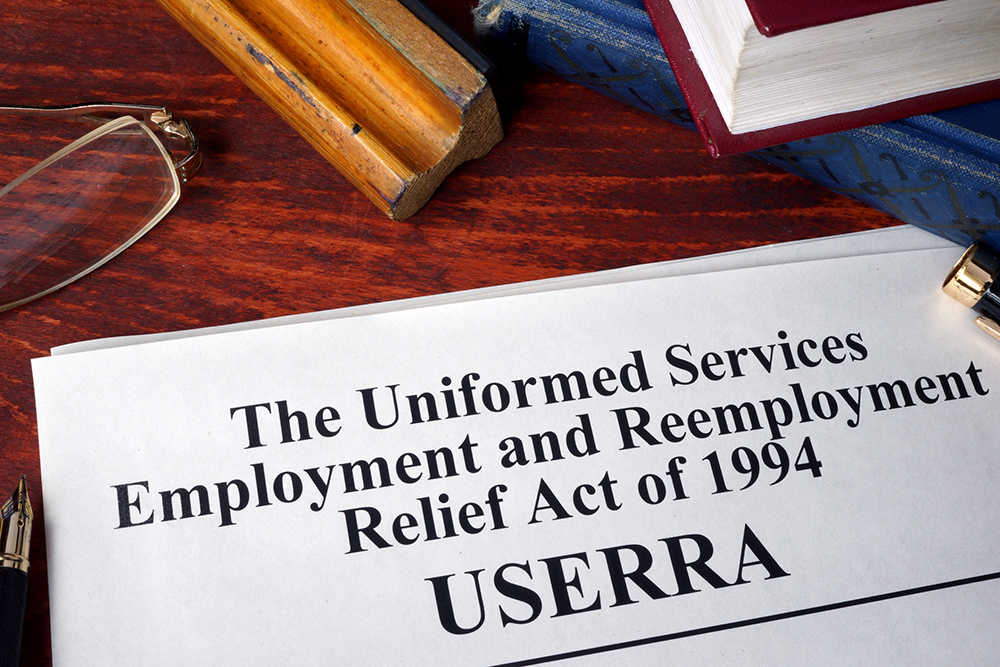For those of you needing a good refresher on your obligations to employees who take leave to serve in the armed forces, the U.S. 7th Circuit Court of Appeals recently decided a case highlighting certain circumstances when you may need to pay them for that time.
Eric White, a United Airlines pilot, was also a member of the Air Force Reserve. Periodically, he was required to take short-term periods of military leave, usually lasting a day or two, during which he received no pay or benefits from the airline.
Under United’s applicable collective bargaining agreement (CBA), however, pilots received pay and continued to accrue certain benefits when they took other types of short-term leave (e.g., jury duty or sick leave), but not while they were on military leave.
White sued United alleging the airline violated the Uniformed Services Employment and Reemployment Rights Act (USERRA). The relevant portion of the law provides that employees on military leave are “entitled to such other rights and benefits not determined by seniority as are generally provided by the employer [to employees who are] on furlough or leave of absence.”
Servicemember Employees Entitled to Comparable Benefits
USERRA allows employees to take leave for military service. Generally, the time can be unpaid, especially in cases of long-term leaves (e.g., if the employee is deployed). Under the Act, however, employees taking military leave also must be treated equally to other workers on similar short-term leave.
In White’s case, the 7th Circuit found questions of fact existed about whether “any leave of absence for which [his] employer provides paid leave is comparable to any given stretch of military leave.” Therefore, the appellate court decided the district court had erred in dismissing his claims. Stated differently, if United provides paid short-term leave for situations comparable to military leave, then the latter circumstances must be paid as well.
So, What Is Comparable Leave?
The U.S. Department of Labor (DOL) regulations governing USERRA say you should consider the following factors in the “comparability analysis,” according to the 7th Circuit:
- Duration of the leave (noted by the regulations to be the most significant factor);
- Its purpose; and
- Employee’s ability to choose when to take the leave.
The 7th Circuit specifically rejected the district court’s finding that military leave was different from other types of leave such as jury duty because White had voluntarily signed up for the service. The appellate court noted that “logic both ignores the text of the regulation and impermissibly penalizes servicemembers for joining the military, in direct contravention of USERRA’s core purpose.”
The 7th Circuit further stated “what matters is an employee’s control over the timing of her leave of absence—i.e., whether she has the option to choose when to take a given stretch of leave.”
Case Allowed to Proceed
The 7th Circuit didn’t determine the merits of White’s claim. Instead, the court held only that the case should be allowed to proceed.
Whether White eventually prevails on the claim will depend on whether the other types of short-term leave offered by United were comparable to his period of military duty.
Takeaways for Employers
The 7th Circuit’s decision in White’s case underscores a simple point for you to keep in mind with respect to employees who are also serving in the military: They shouldn’t be treated less favorably because of their leave.
Other courts have noted USERRA doesn’t require servicemembers to receive preferential treatment. Nevertheless, to avoid a potential violation, you should review other types of comparable leave available to employees to determine whether any of the same benefits also should be granted for military leave.
Grant S. Gibeau is an attorney with Felhaber Larson in Minneapolis, Minnesota. You can reach him at ggibeau@felhaber.com.

